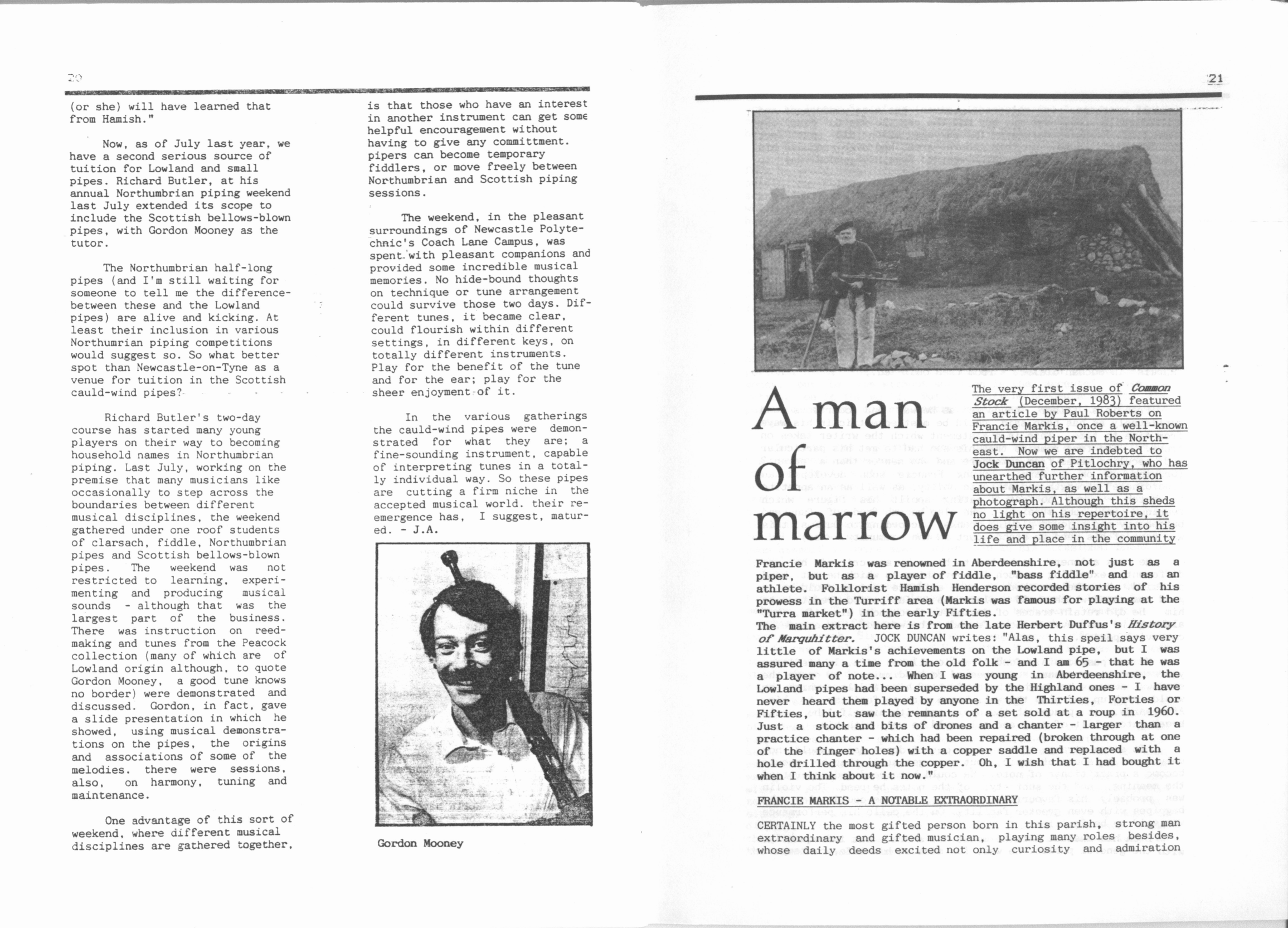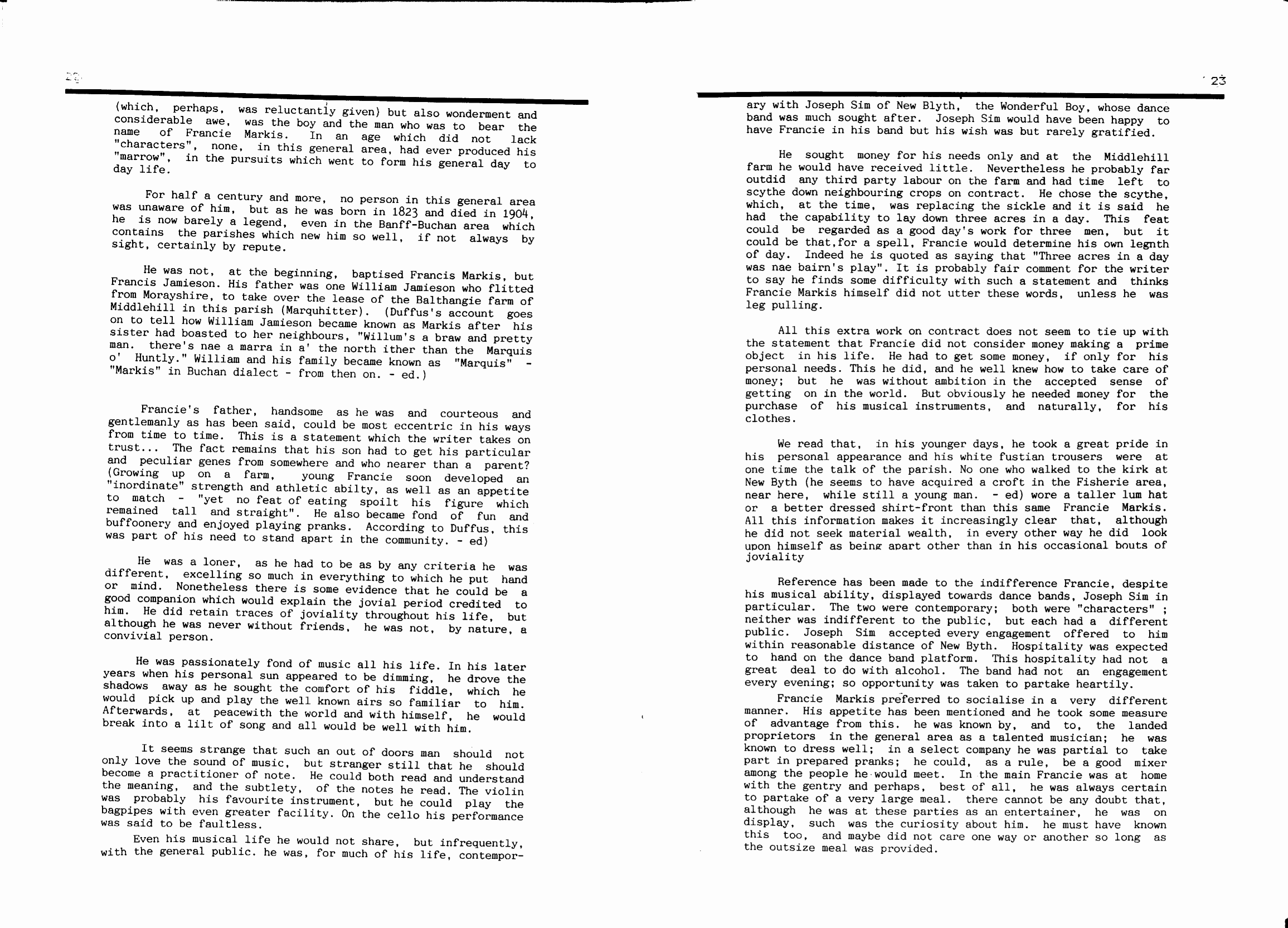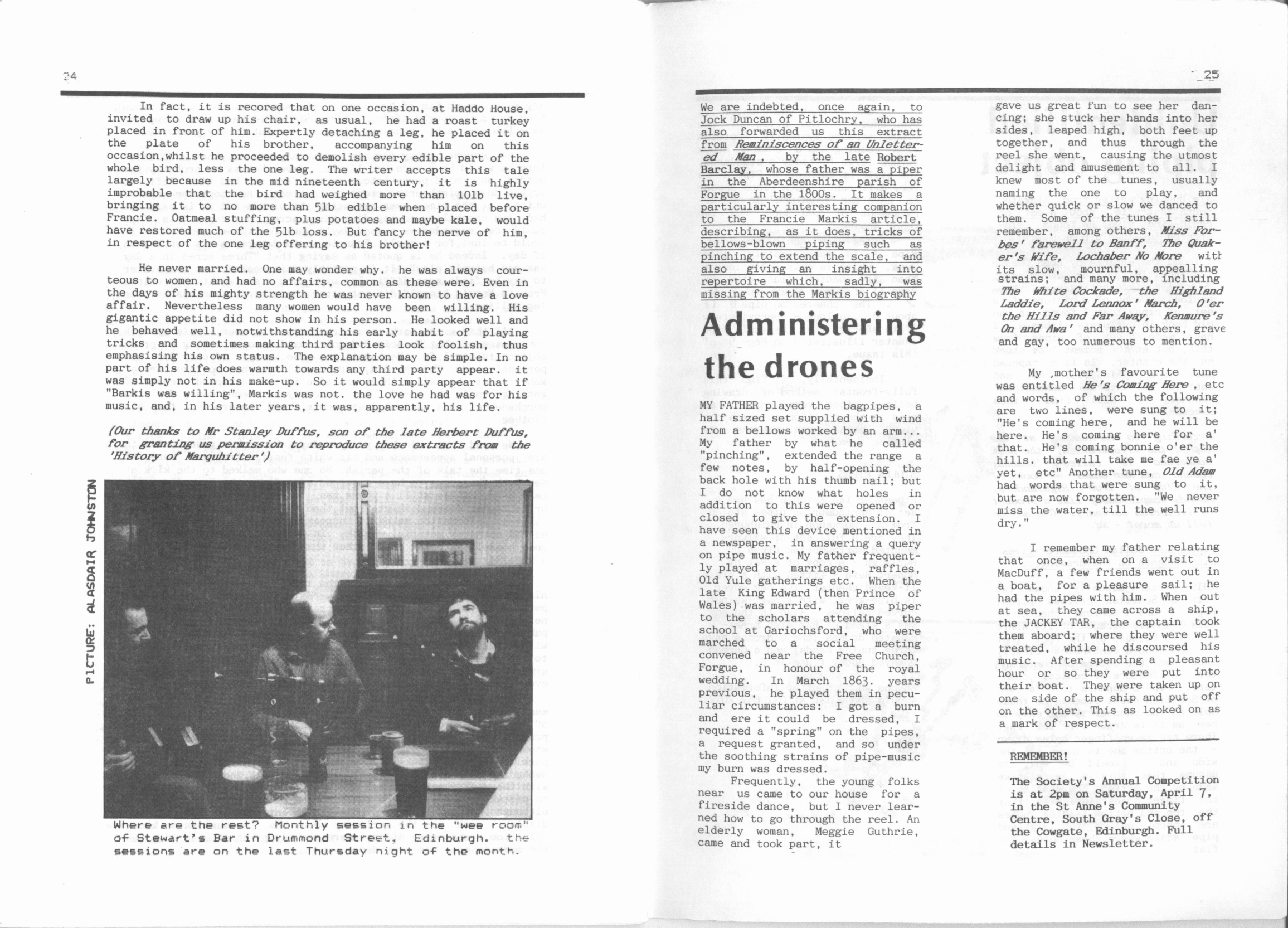A Man Of Marrow



The very first issue of Common Stock (December, 1983) featured an article by Paul Roberts on Francie Markis, once a well-known cauld-wind piper in the North-east. Now we are indebted to Jock Duncan of Pitlochry, who has unearthed further information about Markis, as well as a photograph. Although this sheds no light on his repertoire, it does give some insight into his life and place in the community.
Francie Markis was renowned in Aberdeenshire, not just as a piper, but as a player of fiddle,
"bass fiddle" and as an athlete. Folklorist Hamish Henderson recorded stories of his prowess in the Turriff area (Markis was famous for playing at the "Turra market") in the early Fifties. The main extract here is from the late Herbert Duffus's History of Marquhitter.
JOCK DUNCAN writes: "Alas, this speil says very little of Markis's achievements on the Lowland pipe, but I was assured many a time from the old folk - and I am 65 - that he was a player of note... When I was young in Aberdeenshire, the Lowland pipes had been superseded by the Highland ones - I have never heard them played by anyone in the Thirties, Forties or Fifties, but saw the remnants of a set sold at a roup in 1960. Just a stock and bits of drones and a chanter - larger than a practice chanter - which had been repaired (broken through at one of the finger holes) with a copper saddle and replaced with a hole drilled through the copper. Oh, I wish that I had bought it when I think about it now."
FRANCIE MARKIS - A NOTABLE EXTRAORDINARY
CERTAINLY the most gifted person born in this parish, strong man extraordinary and gifted musician, playing many roles besides, whose daily deeds excited not only curiosity and admiration, (which, perhaps, was reluctantly given), but also wonderment and considerable awe, was the boy and the man who was to bear the name of Francie Markis. In an age which did not lack "characters", none, in this general area, had ever produced his "marrow", in the pursuits which went to form his general day to day life. For half a century and more, no person in this general area was unaware of him, but as he was born in 1823 and died in 1904, he is now barely a legend, even in the Banff-Buchan area which contains the parishes which new him so well, if not always by sight, certainly by repute.
He was not, at the beginning, baptised Francis Markis, but Francis Jamieson. His father was one William Jamieson who flitted from Morayshire, to take over the lease of the Balthangie farm of Middlehill in this parish (Marquhitter). (Duffus's account goes on to tell how William Jamieson became known as Markis after his sister had boasted to her neighbours, "“Willum's a braw and pretty man. there's nae a marra in a' the north ither than the Marquis o' Huntly." William and his Family became known as "Marquis" - "Markis" in Buchan dialect - from then on. - ed.)
Francie's father, handsome as he was and courteous and gentlemanly as has been said, could be most eccentric in his ways from time to time. This is a statement which the writer takes on trust... The fact remains that his son had to get his particular and peculiar genes from somewhere and who nearer than a parent? (Growing up on a farm, young Francie soon developed an "inordinate" strength and athletic ability, as well as an appetite to match - "yet no feat of eating spoilt his figure which remained tall and straight". He also became fond of fun and buffoonery and enjoyed playing pranks. According to Duffus, this was part of his need to stand apart in the community. - ed)
He was a loner, as he had to be as by any criteria he was different, excelling so much in everything to which he put hand or mind. Nonetheless there is some evidence that he could be a good companion which would explain the jovial period credited to him. He did retain traces of joviality throughout his life, but although he was never without friends, he was not, by nature, a convivial person.
He was passionately fond of music all his life. In his later years when his personal sun appeared to be dimming, he drove the shadows away as he sought the comfort of his fiddle, which he would pick up and play the well known airs so familiar to him. Afterwards, at peace with the world and with himself, he would break into a lilt of song and all would be well with him.
It seems strange that such an out of doors man should not only love the sound of music, but stranger still that he should become a practitioner of note. He could both read and understand the meaning, and the subtlety, of the notes he read. The violin was probably his favourite instrument, but he could play the bagpipes with even greater facility. On the cello his performance was said to be faultless. Even his musical life he would not share, but infrequently, with the general public. He was, for much of his life, contemporary with Joseph Sim of New Blyth, the Wonderful Boy, whose dance band was much sought after. Joseph Sim would have been happy to have Francie in his band but his wish was but rarely gratified.
He sought money for his needs only and at the Middlehill farm he would have received little. Nevertheless he probably far outdid any third party labour on the farm and had time left to scythe down neighbouring crops on contract. He chose the scythe, which, at the time, was replacing the sickle and it is said he had the capability to lay down three acres in a day. This feat could be regarded as a good day's work for three men, but it could be that, for a spell, Francie would determine his own length of day. Indeed he is quoted as saying that "Three acres in a day was nae bairn's play", It is probably fair comment for the writer to say he finds some difficulty with such a statement and thinks Francie Markis himself did not utter these words, unless he was leg pulling.
All this extra work on contract does not seem to tie up with the statement that Francie did not consider money making a prime object in his life. He had to get some money, if only for his personal needs. This he did, and he well knew how to take care of money; but he was without ambition in the accepted sense of getting on in the world. But obviously he needed money for the purchase of his musical instruments, and naturally, for his clothes.
We read that, in his younger days, he took a great pride in his personal appearance and his white fustian trousers were at one time the talk of the parish. No one who walked to the kirk at New Byth (he seems to have acquired a croft in the Fisherie area, near here, while still a young man. ~- ed) wore a taller lum hat or a better dressed shirt-front than this same Francie Markis. All this information makes it increasingly clear that, although he did not seek material wealth, in every other way he did look upon himself as being apart other than in his occasional bouts of joviality. Reference has been made to the indifference Francie, despite his musical ability, displayed towards dance bands, Joseph Sim in particular. The two were contemporary; both were “characters" neither was indifferent to the public, but each had a different public. Joseph Sim accepted every engagement offered to him within reasonable distance of New Byth. Hospitality was expected to hand on the dance band platform. This hospitality had not a great deal to do with alcohol. The band had not an engagement every evening; so opportunity was taken to partake heartily.
Francie Markis preferred to socialise in a very different manner. His appetite has been mentioned and he took some measure of advantage from this. he was known by, and to, the landed proprietors in the general area as a talented musician; he was known to dress well; in a select company he was partial to take part in prepared pranks; he could, as a rule, be a good mixer among the people he would meet. In the main Francie was at home with the gentry and perhaps, best of all, he was always certain to partake of a very large meal. There cannot be any doubt that, although he was at these parties as an entertainer, he was on display, such was the curiosity about him. He must have known this too, and maybe did not care one way or another so long as the outsize meal was provided.
In fact, it is recorded that on one occasion, at Haddo House, invited to draw up his chair, as usual, he had a roast turkey placed in front of him. Expertly detaching a leg, he placed it on the plate of his brother, accompanying him on this occasion, whilst he proceeded to demolish every edible part of the whole bird, less the one leg. The writer accepts this tale largely because in the mid nineteenth century, it is highly improbable that the bird had weighed more than 101b live, bringing it to no more than 5lb edible when placed before Francie. Oatmeal stuffing, plus potatoes and maybe kale, would have restored much of the 51b loss. But fancy the nerve of him, in respect of the one leg offering to his brother!
He never married. One may wonder why. he was always courteous to women, and had no affairs, common as these were. Even in the days of his mighty strength he was never known to have a love affair. Nevertheless many women would have been willing. His gigantic appetite did not show in his person. He looked well and he behaved well, notwithstanding his early habit of playing tricks and sometimes making third parties look foolish, thus emphasising his own status. The explanation may be simple. In no part of his life does warmth towards any third party appear. It was simply not in his make-up. So it would simply appear that if “Barkis was willing", Markis was not. The love he had was for his music, and, in his later years, it was, apparently, his life.
(Our thanks to Mr Stanley Duffus, son of the late Herbert Duftus, for granting us permission to reproduce these extracts from the ‘History of Marquhitter')
